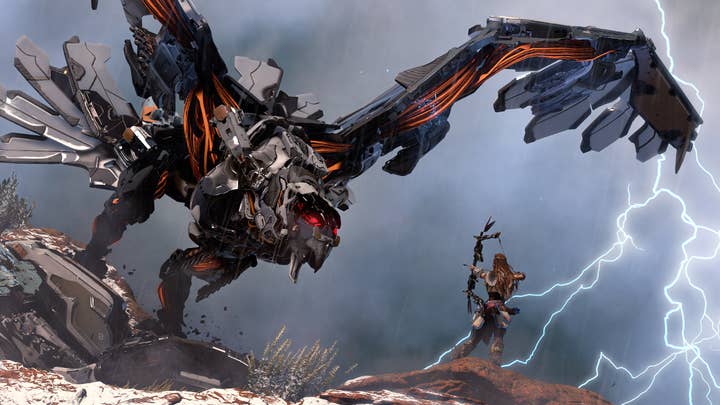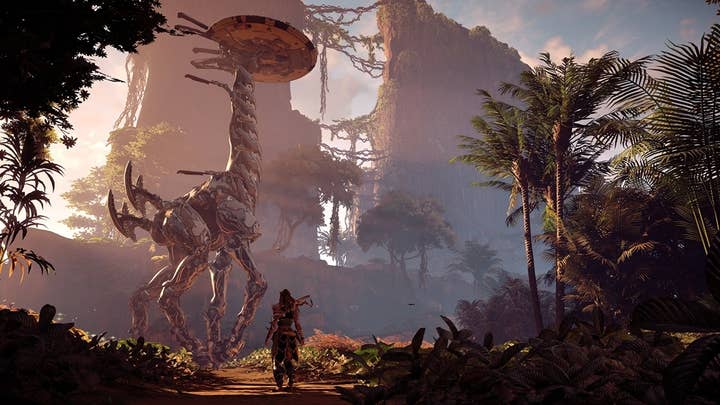Horizon Zero Dawn: Critical Consensus
Guerrilla Games employs some familiar open-world tropes, but its visually spectacular new IP has emerged as an early contender for game of the year
The PlayStation 4 generation is now almost four years old, and Horizon: Zero Dawn has been a tantalising prospect for what feels like all of it. In truth, Guerrilla's open-world IP was first unveiled less than two years ago, at E3 in 2015, but the paucity of major exclusives for Sony's console has made the wait seem egregiously long. The fact that Horizon Zero Dawn is also a completely original IP - an increasingly rare commodity in the AAA console space - has only added to the sense of anticipation. For those fearing a future in which all blockbuster games belong to the same dozen franchises, this is the kind of game you can root for.
For US Gamer, though, that excitement has served to aggravate a nagging sense of disappointment. With so few new IPs made at this scale any more, the hope is for those that do emerge to depart from the familiar. In a 5 out of 10 review, currently the lowest score the game has received, US Gamer argues that Guerrilla plays it safe in too many fundamental areas, relying on a "familiar grind" of gameplay concepts that will need little introduction if, "you've played any modern RPG ever."
"Horizon might be the best-looking open-world game ever made"
The Telegraph
"You pluck herbs from the ground for health and supplies. You hunt (robotic) creatures using a variety of upgradeable bows (alongside other less-useful weapons) along with infinite boars and foxes (literally the only living animals that aren't robots) so that you can craft more things. You talk to strangers on the road and in towns that you've never met before, and help them with their troubles despite any trust issues Aloy [the protagonist] should bear inherently.
"Horizon Zero Dawn is a conglomerate of familiar RPG tasks, and fails to make any of them feel worthwhile; lacking the strong narrative to pull you through or differentiating hook to set the game apart from others in the genre."
This won't be the first occasion on which an open-world RPG has been criticised for lacking diversity in mission design, or a consistent narrative logic that justifies the main character's apparent willingness to participate in an endless stream of other people's busy-work. It is difficult to argue against the notion that a broad change would be welcome, but these shortcomings are so common they have effectively become tropes of the genre. Exactly how much it detracts from what Guerrilla has accomplished here is at least arguable, and there is no shortage of critics providing effusive counterpoints.

Game Informer is just one example of a review noticing some of these issues, but ultimately landing on a much more positive conclusion: in this case 8.75 out of 10, which, it's worth noting, is still below Horizon Zero Dawn's 89 Metacritic average. Indeed, the reviewer's "only major complaint" was Guerrilla's persistence with "the established and increasingly tedious formula" of open-world games.
"You clear out bandit camps, hunt animals for inventory upgrades, and track down various collectibles that clutter your map. Every trip you undertake is disrupted by the urge to collect more crafting items (your primary source of ammo), and every exciting skirmish ends with the unexciting and ritualistic looting of enemy corpses."
However, while "this necessary scrounging" frustrated on occasion, enthusiasm was always revivified by the many areas in which Guerrilla has excelled. Horizon Zero Dawn's combat, in particular, displayed an admirable mix of "standard-yet-satisfying" fights with humans, and show-stealing encounters with the dinosaur-like, robotic "Watchers" that wander the game's huge landscape.
"It's a near-perfect story that creates a world and also provides meaningful answers... Not to soapbox about it, but games don't do that often enough anymore"
Giant Bomb
"Each of the 25 different species of synthetic beast features its own behaviors, attacks, and mechanical components that can be harvested or exploited during the thick of combat. Every species demands a cautious and thoughtful approach; even the weakest Watcher is capable of blinding you and calling in deadlier allies at a moment's notice.
"Taking on a bigger foe like the towering Thunderjaw feels like a full-fledged boss battle and requires multistage strategies like chipping off armor to expose weak points for extra damage, laying out traps to aid a hasty retreat, and tearing off powerful weapons to use against your enemy."
That landscape is another strength, one acknowledged by virtually every review published so far. Indeed, for The Telegraph, the post-apocalyptic world Guerrilla has conceived is perhaps the main reason that Horizon "stands proudly on its own" when so many of its influences are plain to see. In its five-star review, the world is described as "unlike anything else."
"Video games have done The End of the World to death, but rarely so beautifully: long grass sways in the breeze, mist hangs over distant mountains, and ancient metal structures jut out of the greenery, themselves so covered in vegetation that they're almost organic.
"A dynamic weather and time-of-day system brings an extra layer of visual variety to your journey through this massive world, with dust storms, rain, and snow changing the mood: in the snow, scrap metal glistens from the frost; at night, fireflies dance in the darkness; and, on a sunny day, leaves and pollen lazily float through the air... Horizon might be the best-looking open-world game ever made."

For all but a very small handful of Horizon's many reviewers, the ways in which it draws from the same creative well as so many of its peers can't undermine such a gorgeous environment and (human encounters aside) memorable combat. In fact, according to Polygon's 9.5 out of 10 review, Guerrilla has even succeeded in an area that so many games tend to neglect: the story, the characters, and the mystery of exactly what happened to the society that built the structures and machines scattered across the landscape.
"Horizon Zero Dawn is a conglomerate of familiar RPG tasks, and fails to make any of them feel worthwhile"
US Gamer
"Those mysteries are a driving force in Horizon Zero Dawn, so I'll only say that the game surprised me in numerous ways. It's darker than I expected in its imagining of what ended civilization, but it's also more hopeful regarding humanity's chances at continued existence. Aloy herself is largely a tool accomplishing the needs of the game, but Horizon's cast of characters was strong enough to earn my investment.
"It's a cast whose progress through the story I was eager to witness, and the political maneuvering of the world of Horizon weaves myriad opportunities for intrigue both in this game and the future. Horizon Zero Dawn answers the vast majority of the questions it presents. It leaves characters with arcs that feel completed but also a bear sense of continuity, of possible direction for the future. It builds in the potential for sequels and spinoffs, but in a smart, natural way, without the need for frustrating cliffhangers or unresolved plot threads."
If Horizon's sales are anything like as strong as its reviews, then Sony has a hit almost as large as Guerrilla's roaming dinobots on its hands - and one based on entirely original IP. However, in games, as with all mass market entertainment, that means Horizon Zero Dawn will inevitably become a franchise much like those to which it currently seems like a welcome break. For Giant Bomb, which awarded Guerrilla a rare five-stars, the greatness of the game can be measured by just how unwelcome a prospect a sequel currently seems.
"It's a fantastic science fiction tale that expertly hangs the next piece of information just out of reach without feeling like it's stretching its information out too thinly. I thought the game was coming to an end around two-thirds of the way through, only to discover that there were multiple hours of mainline gameplay left to experience and additional answers to seek.
"By the end, Horizon comes to a satisfying conclusion in a way that left me feeling like they should probably never make a sequel. It's a near-perfect story that creates a world and also provides meaningful answers about said world. Not to soapbox about it, but games don't do that often enough anymore. The events of Horizon have weight and the game feels less like franchise building and more like a cohesive statement. Of course, the developers couldn't help but leave in one little bit that hints about what might happen if and when they decide to make another one, which I found to be a little unfortunate. But I guess that's business."






.jpg?width=291&height=164&fit=crop&quality=80&format=jpg&auto=webp)

